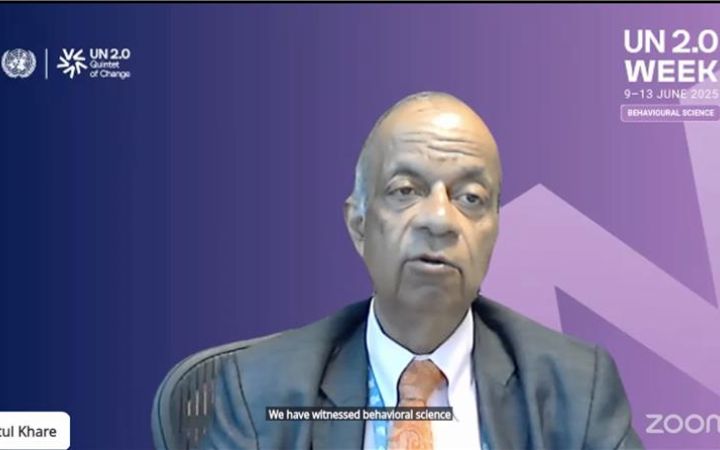Geneva, Switzerland - In the framework of UN 2.0 Week, UNITAR took part in the "Behavioural Science Panel - Delivering for Impact" held on 10 June 2025, bringing together Nearly 1,000 participants to explore how evidence-based understanding of human behaviour can improve policies, programmes, and outcomes, emphasising its critical role in transforming how the United Nations operates and delivers on its mandate.
The UN Secretary-General António Guterres UN 2.0 vision is rooted in a quintet of cutting-edge skills - data, digital transformation, behavioural science, innovation, and strategic foresight - essential for making the UN "nimble and agile" for the 21st century.
Mary MacLennan, Senior Advisor on Behavioural Science at the Executive Office of the Secretary-General, explained -
Behavioural science refers to an evidence-based understanding of how we make decisions and respond to policies, programmes, and incentives. We often make assumptions about human behaviour when designing policies, but people don't always act the way we expect them to.
From Theory to Practice
Streamlining UN Operations
Under-Secretary-General Mr. Atul Khare highlighted how the Department of Operational Support is applying behavioural science to reduce administrative burdens and enhance productivity. His office collaborated with University College London to improve compliance with mandatory tasks, streamline recruitment, and enhance rostering systems.
Behavioural science is not a one-size-fits-all solution but rather a flexible, adaptive tool using evidence gathered through testing approaches,
Mr. Khare noted, emphasising the importance of remaining human-centred and client-focused.
Transforming Learning and Capacity Building
UN Assistant Secretary-General and Executive Director of UNITAR Ms. Michelle Gyles-McDonnough, outlined how behavioural science is embedded throughout the training cycle, from design to evaluation. She emphasised the fundamental importance of this approach:
Behavioural science helps us understand and overcome resistance. It helps us better understand the intention-action gap and behaviours influencing decision-making in critical areas. Without behaviour change, transformation remains out of reach. Let's harness behavioural science: to shape our social environments, to manage organizations more effectively, to design public policies that are human-centred and context-specific, and to empower leaders and communities to drive change.
During her intervention, Ms. Gyles-McDonnough shared concrete examples of impact:
- Road Safety: Over 10,000 government officials from 86 countries have used UNITAR's toolkit on social norms approaches to reduce high-risk driving behaviours
- Airport Emergency Management: 100+ airport managers and civil aviation authorities from 23 countries received training incorporating behavioural science and "Social AI" to better manage crises
- UNOSAT: Uses behavioural science insights to bridge the gap between technical knowledge and sustainable institutional practices that promote disaster preparedness across Asia-Pacific and Africa.
- Combating Financial Crime: Competency framework to strengthen decision-making and ethical judgment to improve suspicious transaction reporting by Compliance Officials, demonstrating how understanding human behaviour can drive systemic change.
At UNITAR, we don't just train and upskill participants - we transform mindsets.
Ms. Gyles-McDonnough stated.
Innovation in Humanitarian Settings
Mr. Hovig Etyemezian from UNHCR's Innovation Service explained how behavioural science strengthens protection outcomes for refugees. Key initiatives include:
- Using behavioural diagnostics in Brazil to understand why asylum seekers weren't accessing free legal aid, leading to improved messaging and more accessible services
- Applying agent-based modelling to anticipate Ukrainian refugees' return decisions based on behavioural drivers like legal status, economic opportunities, and family ties
- Analysing football fans' perceptions of refugees in Germany, Spain, and the UK to identify a "moveable middle" for targeted advocacy
Scaling Impact Through Evidence and Innovation
Ms. Zeina Afif from the World Bank's eMBeD team, with over a decade of experience integrating behavioural science into development operations, emphasised moving beyond simple nudges to rethinking entire systems. The World Bank has worked on more than 150 projects globally, addressing challenges from hurricane early warning systems in Haiti to understanding social norms preventing women's labour market participation.
We've had the greatest impact not only by using behavioural science to improve communication but to rethink how systems are designed.
Ms. Afif explained, advocating for mega-studies and multi-country experiments to generate robust evidence at scale.
Mr. James Walsh from the Agency Fund showcased how behavioural science drives cost-effective innovation in the nonprofit sector. Examples included:
- Rocket Learning in India using behavioural personas to better support 350,000 daycare workers via WhatsApp
- Shamiri is delivering mental health support to 100,000 students in African secondary schools
- Noora Health is using A/B testing to triple registration rates for their maternal health WhatsApp services
Looking Ahead
A recurring theme was democratizing behavioural science knowledge. Behavioural science is very accessible. We all need a certain level of understanding, the same way we all learned communication or IT.
The panelists also emphasized that effective localization requires more than working with local partners - it demands a deep understanding of the communities served. We will be more effective as we understand the perspective, needs, and motivations of the people we're serving.








